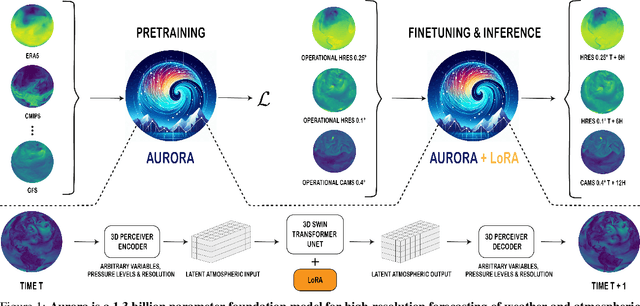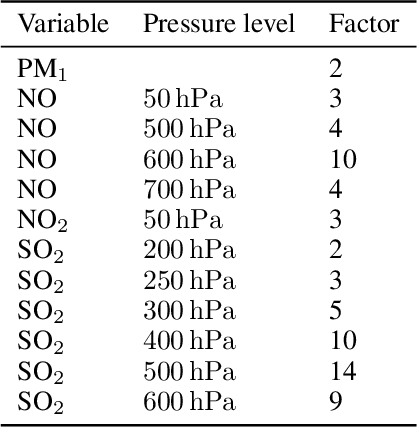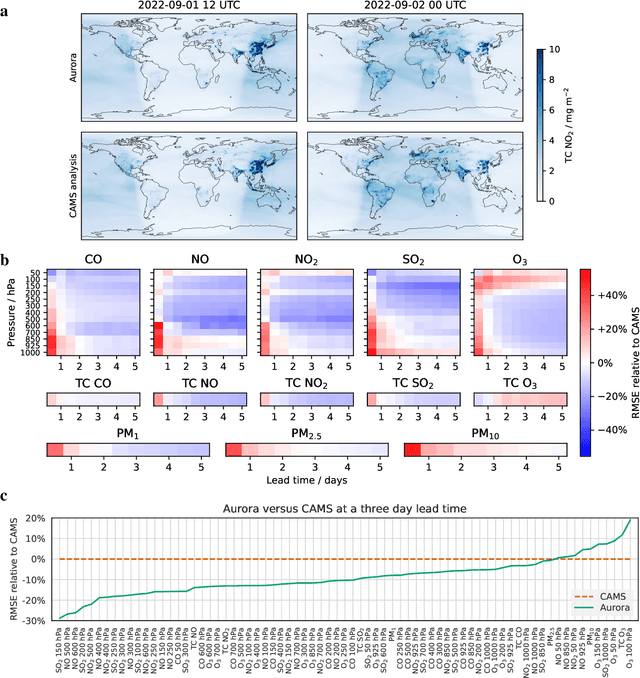Maik Riechert
UniGenX: Unified Generation of Sequence and Structure with Autoregressive Diffusion
Mar 09, 2025Abstract:Unified generation of sequence and structure for scientific data (e.g., materials, molecules, proteins) is a critical task. Existing approaches primarily rely on either autoregressive sequence models or diffusion models, each offering distinct advantages and facing notable limitations. Autoregressive models, such as GPT, Llama, and Phi-4, have demonstrated remarkable success in natural language generation and have been extended to multimodal tasks (e.g., image, video, and audio) using advanced encoders like VQ-VAE to represent complex modalities as discrete sequences. However, their direct application to scientific domains is challenging due to the high precision requirements and the diverse nature of scientific data. On the other hand, diffusion models excel at generating high-dimensional scientific data, such as protein, molecule, and material structures, with remarkable accuracy. Yet, their inability to effectively model sequences limits their potential as general-purpose multimodal foundation models. To address these challenges, we propose UniGenX, a unified framework that combines autoregressive next-token prediction with conditional diffusion models. This integration leverages the strengths of autoregressive models to ease the training of conditional diffusion models, while diffusion-based generative heads enhance the precision of autoregressive predictions. We validate the effectiveness of UniGenX on material and small molecule generation tasks, achieving a significant leap in state-of-the-art performance for material crystal structure prediction and establishing new state-of-the-art results for small molecule structure prediction, de novo design, and conditional generation. Notably, UniGenX demonstrates significant improvements, especially in handling long sequences for complex structures, showcasing its efficacy as a versatile tool for scientific data generation.
Aurora: A Foundation Model of the Atmosphere
May 20, 2024



Abstract:Deep learning foundation models are revolutionizing many facets of science by leveraging vast amounts of data to learn general-purpose representations that can be adapted to tackle diverse downstream tasks. Foundation models hold the promise to also transform our ability to model our planet and its subsystems by exploiting the vast expanse of Earth system data. Here we introduce Aurora, a large-scale foundation model of the atmosphere trained on over a million hours of diverse weather and climate data. Aurora leverages the strengths of the foundation modelling approach to produce operational forecasts for a wide variety of atmospheric prediction problems, including those with limited training data, heterogeneous variables, and extreme events. In under a minute, Aurora produces 5-day global air pollution predictions and 10-day high-resolution weather forecasts that outperform state-of-the-art classical simulation tools and the best specialized deep learning models. Taken together, these results indicate that foundation models can transform environmental forecasting.
Fast and Memory-Efficient Neural Code Completion
Apr 29, 2020



Abstract:Code completion is one of the most widely used features of modern integrated development environments (IDEs). Deep learning has recently made significant progress in the statistical prediction of source code. However, state-of-the-art neural network models consume prohibitively large amounts of memory, causing computational burden to the development environment, especially when deployed in lightweight client devices. In this work, we reframe neural code completion from a generation task to a task of learning to rank the valid completion suggestions computed from static analyses. By doing so, we are able to design and test a variety of deep neural network model configurations. One of our best models consumes 6 MB of RAM, computes a single suggestion in 8 ms, and achieves 90% recall in its top five suggestions. Our models outperform standard language modeling code completion techniques in terms of predictive performance, computational speed, and memory efficiency. Furthermore, they learn about code semantics from the natural language aspects of the code (e.g. identifier names) and can generalize better to previously unseen code.
AMPNet: Asynchronous Model-Parallel Training for Dynamic Neural Networks
Jun 22, 2017



Abstract:New types of machine learning hardware in development and entering the market hold the promise of revolutionizing deep learning in a manner as profound as GPUs. However, existing software frameworks and training algorithms for deep learning have yet to evolve to fully leverage the capability of the new wave of silicon. We already see the limitations of existing algorithms for models that exploit structured input via complex and instance-dependent control flow, which prohibits minibatching. We present an asynchronous model-parallel (AMP) training algorithm that is specifically motivated by training on networks of interconnected devices. Through an implementation on multi-core CPUs, we show that AMP training converges to the same accuracy as conventional synchronous training algorithms in a similar number of epochs, but utilizes the available hardware more efficiently even for small minibatch sizes, resulting in significantly shorter overall training times. Our framework opens the door for scaling up a new class of deep learning models that cannot be efficiently trained today.
 Add to Chrome
Add to Chrome Add to Firefox
Add to Firefox Add to Edge
Add to Edge